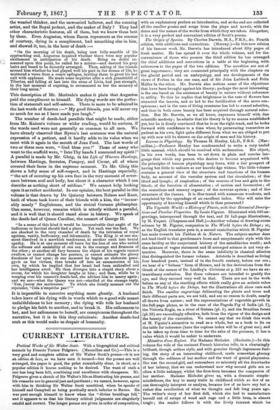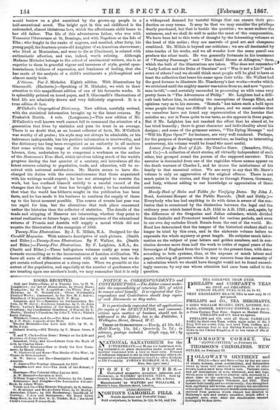11f6noires dune Enfant. Par Madame Michelet. (Hachette.)—In this. volume the
wife of the eminent French historian tells, in a charmingly brilliant, though artless style, and with genuine though ingenuous feel- ing, the story of an interesting childhood, made somewhat gloomy through the coldness of her mother and the want of genial playmates. She was the second girl, and remembers so minutely all the drawbacks of her infancy, that we can understand now why second girls are so often a little unhappy, whilst the first-born becomes the companion of her mother. Madame Michelet gives us, with a dramatic simple- mindedness, the key to many traits in childhood which so few of us can thoroughly interpret or analyze, because few of us have any but a rather dim recollection of what we thought and felt long years ago. The writer's story of her first doll, which she had to manufacture herself out of scraps of wood and rags and a little bran., is almost tragic ; the reader follows it with the lively interest which he
would bestow on a plot contrived by the grown-up people in a half-sensational novel. The bright spot in this sad childhood is the unbounded, almost idolatrous love, which the affectionate child bears to her old father. The life of this adventurous father, who was with Toussaint l'Ouverture at St. Domingo, and with Napoleon at the Isle of Elba ; who fought in the ranks of negroes, and married, after forty, his young pupil, the fourteen-years-old daughter of an American slaveowner ; who lived at Montauban, and went to die at Cincinnati, is related with
enthusiastic affection, and was, indeed, worth relating. Although
Madame Michelet belongs to the school of sentimental writers, she is so superior to them in graceful vigour and terseness of style, genial open- heartedness, boldness of expression, and frankness of feeling, that she has made of the analysis of a child's sentiments a philosophical and almost manly book.



































 Previous page
Previous page